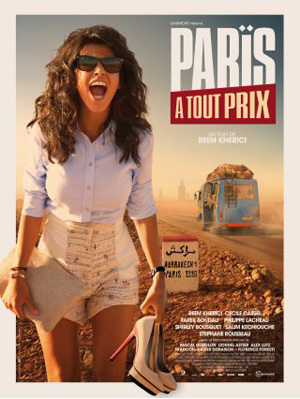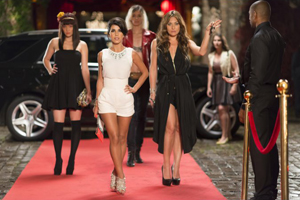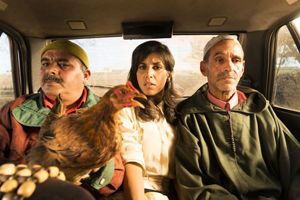Paris à Tout Prix: The Road from Marrakech
- SUBSCRIBE
- ALREADY SUBSCRIBED?
BECOME A BONJOUR PARIS MEMBER
Gain full access to our collection of over 5,000 articles and bring the City of Light into your life. Just 80 USD per year.
Find out why you should become a member here.
Sign in
Fill in your credentials below.
 Reem Kherici belongs to a growing group of young women movie-makers making their mark on the French film scene (Maiwann is another). Like Maiwann, Kherici is of North African heritage, which has provided the subject matter as well as the picturesque backdrop of Paris à Tout Prix (literally Paris At Any Price).
Reem Kherici belongs to a growing group of young women movie-makers making their mark on the French film scene (Maiwann is another). Like Maiwann, Kherici is of North African heritage, which has provided the subject matter as well as the picturesque backdrop of Paris à Tout Prix (literally Paris At Any Price).
The film is about a potentially grim topic: a North African immigrant who’s lived in France nearly all her life finds herself expelled to a homeland that is no longer her home. But Ms. Kherici has chosen to make a comedy, portraying her serious subject with farcical strokes. Much of this comes from self-satire. Kherici, a beautiful actress as well as a director, mercilessly mocks the character she plays as an essentially likeable woman who’s let good looks turn her into a vain, ditzy hipster.
Maya leads a much more charmed life than the typical immigrant. Beautiful, talented, connected, she works for a fashion house run by an authoritarian coutourier and filled with sycophantic and/or snobbish fashionistas. She has trendy friends, a charming cat, a nice apartment, makes the scene. Maya is competing with another young designer to come up with a dazzling creation for an upcoming show. The winner is to get a real job at the house, the coveted “CDI” (unlimited work contract). But when Maya is stopped by the police for a traffic violation, she is caught with an expired visa.
 Maya suddenly finds herself an illegal alien, and is forced to return to her family’s village in rural Morocco. There are splendid travelogue shots of the country, but life in the bled is depicted in a way reminiscent of the old Ma and Pa Kettle movies. Maya bonds with her wise, earthy grandmother, but also falls back into love-hate rivalry with her brother. What gives dramatic backbone to the film is the estrangement between Maya and her father. When Maya’s mother lay dying of cancer he didn’t contact his daughter to come to her deathbed. Maya has resented her father ever since and stopped visiting, which has left the proud paterfamilias just as resentful.
Maya suddenly finds herself an illegal alien, and is forced to return to her family’s village in rural Morocco. There are splendid travelogue shots of the country, but life in the bled is depicted in a way reminiscent of the old Ma and Pa Kettle movies. Maya bonds with her wise, earthy grandmother, but also falls back into love-hate rivalry with her brother. What gives dramatic backbone to the film is the estrangement between Maya and her father. When Maya’s mother lay dying of cancer he didn’t contact his daughter to come to her deathbed. Maya has resented her father ever since and stopped visiting, which has left the proud paterfamilias just as resentful.
What is pleasantly ironic about Paris à Tout Prix is that Kherici, a director of Tunisian heritage, has filmed her movie in the style of traditional French comedy. The director isn’t perfect (close and medium shots don’t always coordinate felicitously), but she’s mostly competent and keeps the action lively. She also brings out the actors’ personalities in a warm, vivid way, not excluding walk-on roles and even bad guys.
Kherici herself is a convincing actress. She can be stubborn, dotty, sultry, snide, and romantic, sliding effortlessly from one register to another. The rest of the cast works well as a comic ensemble. Unsurprisingly, the Moroccans make the best of an occasion to play off of, instead of within, the usual stereotypes. Mohammed Bastaoui as Maya’s father has a strong presence, soulful as well as hurt and bitter, though his role eventually descends into sentimentality. Kherici clearly wanted to take her film in various interesting directions, but she never loses sight of her commercial genre.
 Sometimes Kherici stretches credulity. We can’t believe that Maya doesn’t speak Arabic even if she’s lived in France most of her life. And we definitely can’t believe it when some of her Parisian acquaintances conveniently show up in Morocco on vacation. This cranks up the comic plot—Maya’s told her boss that she’s away on medical leave, which is untrue, while the none-too-friendly co-workers reveal that she’s on vacation (also not true). This comic logic just about makes up for the lack of plausibility.
Sometimes Kherici stretches credulity. We can’t believe that Maya doesn’t speak Arabic even if she’s lived in France most of her life. And we definitely can’t believe it when some of her Parisian acquaintances conveniently show up in Morocco on vacation. This cranks up the comic plot—Maya’s told her boss that she’s away on medical leave, which is untrue, while the none-too-friendly co-workers reveal that she’s on vacation (also not true). This comic logic just about makes up for the lack of plausibility.
Even after being deported to Morocco, our plucky designer keeps trying to win the competition. The only thing that can save her is the precious CDI. In a nice twist, re-connecting with her homeland is precisely what provides her with inspiration. In short, Paris à Tout Prix is a feel-good chick-flick. Except that it’s also a grab-bag of other things: scabrous satire of the fashion world, ethnic comedy, and family drama. It’s also an examination of the plight of vulnerable immigrants and a portrait of the divided heritage of more and more Europeans.
While in Morocco Maya prances around in short-shorts, seemingly without attracting hostile looks. Is Kherici making a point about tolerance in North Africa, as opposed to the harsh view of women in Muslim garb in France? It’s a pertinent, if troubling, question after recent riots sparked by police enforcing a law against the wearing of the burka.
 This saucy comedy produces a nice cocktail of sweet and sour emotions. It leaves you with a healthy dose of scepticism towards immigration policy whatever the country, contempt for fashion slavery, and a reminder of the hassles of family life. At the same time it makes you want to check out the fashion scene in Paris (if you can get past the gatekeepers), and visit Morocco. And it definitely makes you want to see the next film with or by Reem Kherici.
This saucy comedy produces a nice cocktail of sweet and sour emotions. It leaves you with a healthy dose of scepticism towards immigration policy whatever the country, contempt for fashion slavery, and a reminder of the hassles of family life. At the same time it makes you want to check out the fashion scene in Paris (if you can get past the gatekeepers), and visit Morocco. And it definitely makes you want to see the next film with or by Reem Kherici.
Production: Mandarin Cinéma
Distribution: Gaumont
Photos © Pierre-Elie de Pibrac / Gaumont – Mandarin Cinéma
More in film review, French film, Paris à Tout Prix, Paris film, Reem Kherici




